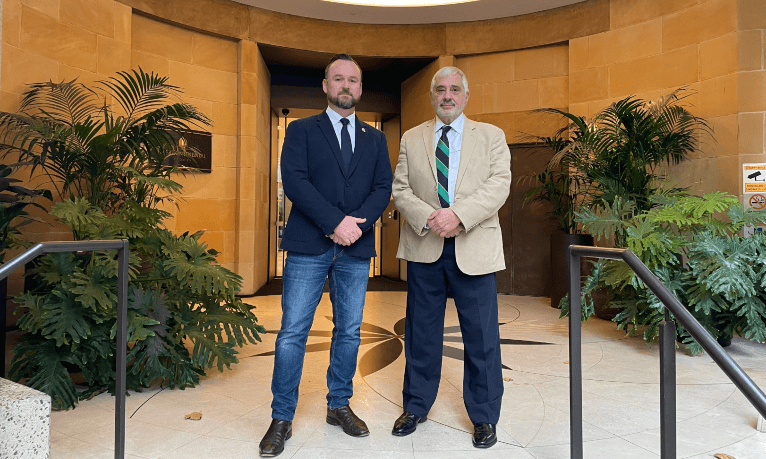Veterans hitting the surf to build community

Tim Dalli and Luke Stewart, President and Vice President of the Association of Veteran Surfers Ballina Byron and RSL NSW members, help bring local veterans and their families together to build support and community. We caught up with Tim and Luke to talk about how they’re doing it and the impact on their mental wellbeing.
Q: Tim, how did you get involved with setting up an Association of Veteran Surfers (AVS) in Ballina?
Tim Dalli: I was medically discharged with post traumatic stress and ended up isolating myself for a few years. Then Phil Overton, a mate I served with in the Navy but hadn’t spoken to in years, reached out to me to see if I’d be interested in starting an AVS chapter here. He’d recognised the positive impact surfing was having on his own mental health and wanted to spread the word.
The Ballina RSL sub-Branch worked with Veteran Sport Australia, and the sub-Branch funded a learn-to-surf day – that’s how it kicked off.
Then I connected with Luke Stewart who’s been involved with other veteran support groups. We’ve both been wanting to do something for veterans in the area.
There was already a group in Queensland doing it so we were able to use them as a kind of template, and now there’s a few groups up and down the east coast.
Q: What does an AVS meet up look like?
Luke Stewart: We’ve been lucky to have support from local surf coaches who have lent us boards when we need them. We usually paddle out from Flat Rock because it’s the safest spot to access the water even for beginners, and then everyone just has a go. Sometimes that means getting tumbled around a lot in the whitewater!
If we’re running a learn-to-surf day we fire up a barbecue and get as many veterans and their families up on boards as possible.
Coming out of the ADF and transitioning into civilian life is extremely difficult. These meet ups give veterans an opportunity to be with other people who understand those challenges.
Q: What is it about surfing that has such a positive impact?
Luke: When you’re out there on the water, you can leave all the noise of what’s happened to you behind for a while.
It’s not escapism so much as connection – with yourself, with the environment, with the moment. Surfing teaches you how to flow and relax. And that’s really important for people who’ve worked in Defence, where you are just on 24/7.
Tim: There’s definitely a philosophy to surfing that’s useful to tap into. I couldn’t surf to save my life, but I found myself getting out of bed on a Sunday morning in winter to jump in the water and I didn’t think I’d ever do something like that. It has very immediate mental health benefits for me.
And surfing is also a great ego-leveller!
Q: Why do you involve families in the meet ups as well?
Tim: Including partners and kids is really important and can make it easier for some veterans to show up. Even if you have a mate who gets you to the beach, they can come along too. And for single parents who want to come, it’s much easier if they can bring their kids. We really want to concentrate on being family-friendly going forward.
Q: The theme of Veterans’ Health Week is ‘get moving’. What would you like to share with other veterans about the impact of exercise in your life?
Luke: The pandemic was a particularly tough time for a lot of veterans because staying stagnant for long periods of time can be a trigger for depression and PTSD to kick in. I’d really encourage people to push themselves to make the choice to go outside. Movement is fundamental to mental health.
Tim: When I was really unwell, just getting out of bed was a massive challenge. And it can be a slippery slope. You end up making excuses not to get up. But the mental impact of moving is incredible and it has a follow on effect of making you gradually more energetic. Even on your worst day, try to do something. It doesn’t have to be a surf or a run. A walk is better than nothing.
Surfing is a catalyst for us to come together, and that community connection, support and understanding is critical. More than 1200 veterans have taken their own lives since 2001, and both Luke and I have experienced the toll of mental health issues. We want to do everything we can to help veterans and their families, regardless of their RSL membership status or where they live. If we can’t help, we have access to contacts and resources that can.
And if you feel like having a paddle out on a board with some company, reach out to us or the Ballina RSL sub-Branch.
Watch RSL NSW’s Veteran Health Week webinar Get moving in civilian life: tips from four recent veterans.







